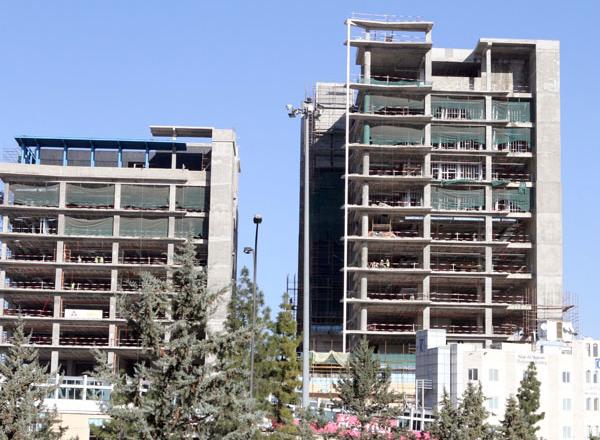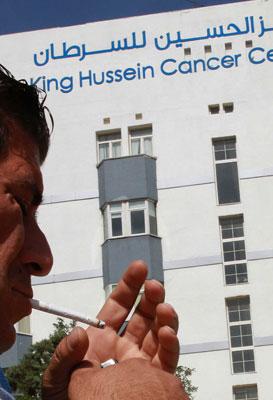You are here
Argileh smokers prone to symptoms of ‘distressed respiratory system’ — study
By JT - Jan 11,2017 - Last updated at Jan 12,2017

According to the World Health Organisation, one shisha session (45 minutes) is the equivalent of smoking 60 cigarettes and may even reach 200 cigarettes (File photo)
AMMAN — Regular argileh smoking is associated with a reporting of substantially more respiratory symptoms in young adults, according to a new study conducted by the King Hussein Cancer Center’s (KHCC) Cancer Control Office.
The study, funded by the KHCC, was conducted “because little is known about the early onset effects of regular shisha smoking”, the centre said in a statement released on Wednesday.
“Given that young populations are driving the spread of this popular trend, it is important to assess the early damage associated with regular shisha use [among]the youth,” the statement added.
The two-year pilot study, recently published in the journal Respiratory Medicine, measured the effect of habitual long-term water pipe use on pulmonary symptoms, pulmonary function, and cardiopulmonary exercise capacity in young men.
The findings are drawn from data on 138 young healthy males between the ages of 18 and 26, where 69 Shisha smokers were compared to 69 non-smokers.
“Our findings were alarming at all levels of investigation,” the statement quoted lead researcher Feras Hawari, chief of the pulmonary and critical care section and director of the Cancer Control Office at the KHCC, as saying.
“Young adults who smoke shisha regularly have a greater burden of respiratory symptoms than adults of their age who do not smoke. These symptoms — cough, shortness of breath and sputum production — may not seem so severe, but they all are signs of a distressed respiratory system, and are shocking to see at such an early age,” Hawari explained.
“Our data also show that shisha smokers have impaired lung function readings that trend lower than those of non-smokers, and also have a reduced exercise capacity,” he added.
“What this tells us is that there is a mechanism of harm at play here leading shisha smokers to have a cardiopulmonary system that works less efficiently than that of nonsmokers.”
The study also describes how an earlier muscle fatigue in shisha smokers may be contributing to these findings.
In addition, the study shows that shisha smokers are on average 6kg heavier than non-smokers and their body-mass index is already at the overweight mark.
This is to be expected, considering the way in which shisha is smoked — sitting down for extended amounts of times, often with easy access to food and beverages, the statement said.
“It is part of the KHCC’s role to support research that contributes to improving public health and provides credible information, especially with the rise of shisha smoking among our youth, which in turn increases public awareness to build a more healthy and educated generation that will ultimately give back to society as a whole,” the statement quoted KHCC Director Asem Mansour as saying.
Mansour also emphasised the importance of national collaborative efforts to fight the tobacco epidemic by enforcing the implementation of smoking bans.
In the same vein, Hawari said the public needs to be made aware of the harms of smoking argileh.
“It is our responsibility to warn our families and loved ones against this deceivingly ‘harmless’ practice. Our data can be used by countries across the globe to draft better legislation and ensure a more serious implementation of laws that fight tobacco, considering how scarce and much needed such data is,” he added.
According to the World Health Organisation, one shisha session (45 minutes) is the equivalent of smoking 60 cigarettes and may even reach 200 cigarettes, in which more than 7,000 toxic chemicals are inhaled and over 70 are known to cause cancer.
The most abundant compounds found in tobacco smoke include carbon monoxide, tar, and heavy metals, all in which increase the likelihood of chronic respiratory symptoms in addition to higher risk of cancer.
Tobacco smoke has also been linked to lower IQ levels, especially in those who start smoking at a young age; however, studies to this day continue to investigate the effects smoking has on one’s health.
Despite its toxic content, shisha use continues to grow in many parts of the world driven mainly by younger generations, the statement said.
People believe that argileh use is less harmful than cigarettes and not addictive. It has become culturally “acceptable” and easily accessible at cafes located within various neighbourhoods in the Kingdom, at convenient prices.
Argileh smokers are likely to be exposed to other poisonous substances as well, seeing as the manufacturing process of “muassel” (flavoured tobacco used in argileh) is still not regulated according to the specifications and standards set by the Ministry of Health and the Jordan Standards and Metrology Organisation.
Research previously conducted by the KHCC’s Cancer Control Office has also shown that even a single 45-minute session of shisha smoking has adverse effects on lung function and exercise capacity.
Related Articles
The year 2015 will be dedicated to the fight against smoking, according to HH Princess Dina Mired, director general of the King Hussein Cancer Foundation (KHCF).
AMMAN — Although he has been a smoker for the past 17 years, Abdullah Akayleh had more than one reason to benefit from Ramadan’s long fastin
AMMAN — Yazeed was 12 years old when he had his first shisha, an instrument for vaporising and smoking flavoured tobacco.
















